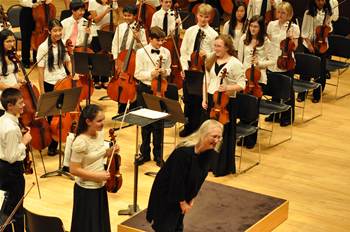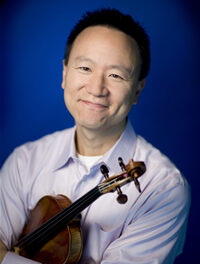The Triangle Guitar Society, an organization dedicated to the advancement of knowledge and exposure to the classical and flamenco guitar, presented the Minneapolis Guitar Quartet at the lovely Carrboro Century Center. Formed in 1986, this group of four classically trained guitarists was/is part of a proliferation of ensembles of this kind that all lead back to The Romeros. Before that family of guitarists took the music world by storm beginning in the late 1950s, there really was no such animal as a “guitar quartet,” certainly none as popular as they. The Romeros made this a family business with the group still in existence, now with a third generation of their family on stage. They spawned a growth of exciting and creative groups such as the Los Angeles Guitar Quartet, the Brazilian Guitar Quartet, the Minneapolis Guitar Quartet and numerous others.
Joseph Hagedorn, a founding member of the Minneapolis Guitar Quartet and responsible for a majority of the arranging for the group, is the only member of the group who has been here before, having played a solo program for the Triangle Guitar Society in 1990. The other members are Serbian-born Maja Radovanlija, who joined the group in 2012, Wade Oden, and Benjamin Kunkel, the newest member and the only one originally from Minnesota. They all play a standard classical guitar and they use no enhancements or special effects of any kind. They are quite unique for any musical ensemble in that they practice the very rare and dangerous equivalent of walking a tightrope without a net: all four of them use no music at all throughout their entire program; it is all played from memory!
The opener was “Windy” by the late, great Argentinian master, Astor Piazzolla. This performance was a foreshadowing of the remainder of the first half. Hagedorn did mention that their plane was very late and there were also some unforeseen problems with their brief stay in our community, and it seemed, to this writer, that they couldn’t quite get past that in the first half of their program. All the notes were there, but there was no rhythmic vitality or passion, and most of the playing took place at the same middle-of-the-road dynamic range.
The next piece, The Sea Between, was composed in 2014 by former Minneapolis Guitar Quartet member David Crittenden. It is in three parts, the first a rather uninspiring adaptation of the well-known British folk song “Scarborough Fair.” The second, “Humoresque,” was a mini musical comedy routine where the players played on each other’s guitars. Much of the audience seemed to enjoy it. There was then a somewhat superfluous correction of the “BWV” number for a scheduled work by Bach, only to then notify us that it would not be played! The next scheduled work had the correct “BWV” number (913) and was played, but may as well not have been. This arrangement was clunky and some early memory lapses in one of the players appeared to infect the confidence of the others for a good part of the remainder. The bad news was that this was certainly not representative of such a seasoned and respected ensemble; the good news was that they hit bottom here. Their reversal was steep, quick, and very welcome. It began with the first half closer, a lovely adaptation of a set of piano works, Two Finnish Pieces, by Maria Kalaniemi.
We’ve all seen it happen in sports. A team comes out in the second half and they seem resurrected with a spark of energy and renewed talents that were always there but lay dormant in the first half. This was exactly what happened here, ironically with music that was technically much more difficult. First was a Serbian work, arranged by member Radovanlija that is one of those treacherous odd-metered works typical of folk music of that region. The playing was suddenly alive, rhythmically crisp, nice dynamic shading, and, perhaps best of all, the quartet sounded and looked like they were having fun.
Then came two sets of works that not only amply made up for any deficiencies of the first half, but also showed the wide variety of what is often simply referred to as “Spanish” music. First was an arrangement of four non-guitar works by the blind Spanish composer Joaquin Rodrigo. His style has a recognizable biting dissonance and rhythmic propulsion that instantly marks it as Rodrigo, and the quartet was spectacular in bringing it to life. There were finally some virtuosic passages for the players to proudly display their chops. Just when you thought that they reached their apex, they ratcheted up the dance rhythms and harmonic complexity with a stunning performance of Danzas Argentinas by Alberto Ginastera. In both this, and the previous work by Rodrigo, it should be noted that, for a guitar quartet where there’s not all that much original music, it all starts with the skill of the arranger. The program does not, but should, specify who did the arrangements. They are the starting point and without their skill in translating this music into a credible version for four guitars, there would be no guitar quartets.
This was quite a musical roller coaster ride, but it ended on many fabulous high notes. That must have been a great halftime speech.












